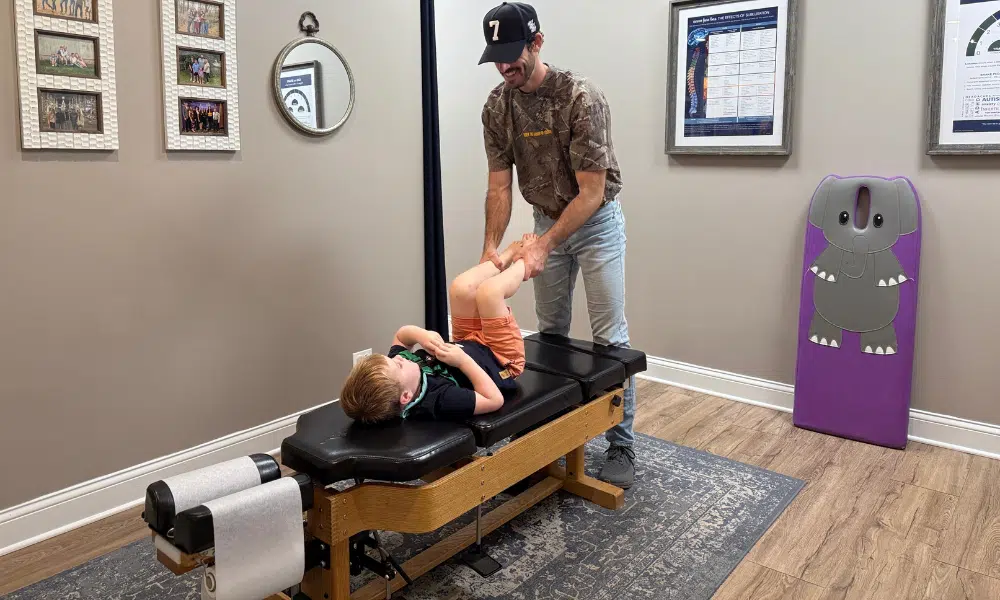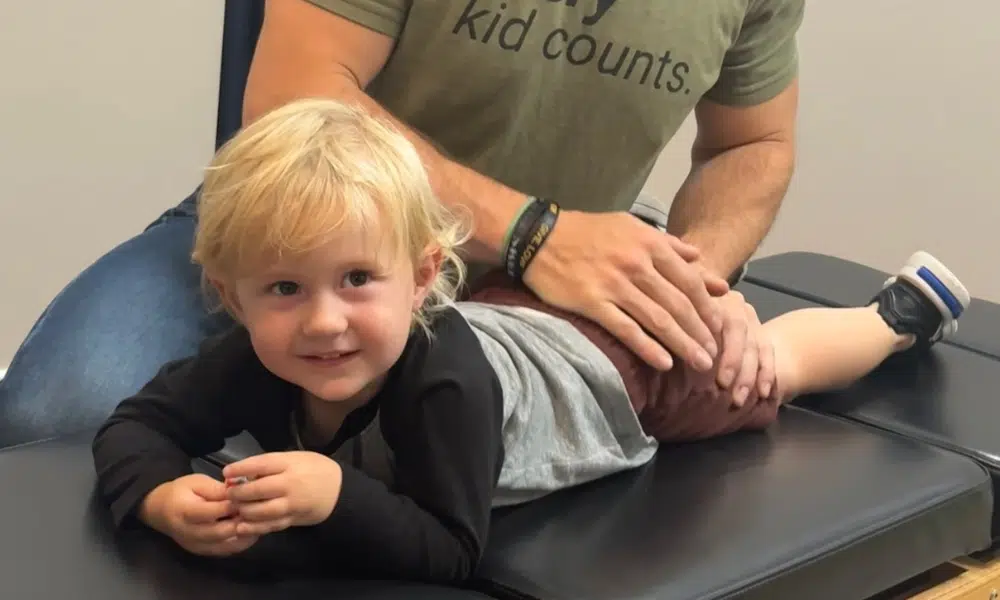As a parent, you never think you’ll spend so much time worrying about someone else’s bowel movements—but when your child is constipated, it quickly becomes a daily concern. The bloating, discomfort, and frustration can be stressful for both your child and you, leaving many parents searching for quick solutions.
When faced with a constipated child, many parents turn to over-the-counter stool softeners to give their kids some relief. While these medications can provide temporary relief, they don’t typically address the underlying causes of your child’s digestive distress in the first place.
Constipation is surprisingly common, showing up in roughly one out of every 20 pediatrician visits, yet it’s often treated as a simple inconvenience rather than a sign that something deeper is out of balance.
At PX Docs, we believe that constipation is more than just a challenge to manage; it’s a sign that your child’s body is out of balance. Our network of Neurologically-Focused pediatric chiropractors takes a drug-free approach to children’s health, looking beyond surface-level signs to identify and address the root causes of constipation and other digestive issues.
To help parents manage a constipated toddler, we’ll explore the world of kids’ laxatives, examining how they work, their potential side effects, and the limitations of relying solely on medication for managing constipation.
What Are Laxatives for Kids?
Laxatives are medications designed to help alleviate constipation by promoting bowel movements. They work through various mechanisms to make stools softer, easier to pass, or stimulate the intestines to contract and push out the stool.
When it comes to children, several types of kids’ laxatives are commonly used:
- Stool softener for kids: These laxatives draw water into the stool, making it softer and easier to pass. Docusate sodium is a typical example of a stool softener.
- An osmotic laxative for kids: These medications help retain water in the intestines, soften the stool, and promote bowel movements. Common osmotic laxatives include polyethylene glycol (Miralax), magnesium hydroxide (Milk of Magnesia), and lactulose.
- A lubricant laxative for kids: These laxatives coat the stool with a waterproof film, allowing it to retain moisture and making it slippery and more accessible to pass. Mineral oil is an example of a lubricant laxative.
- A stimulant laxative for kids: These medications stimulate the nerves in the intestines, causing the muscles to contract and push out the stool. Senna and bisacodyl are examples of stimulant laxatives.
When a child is constipated, their pediatrician may recommend one or a combination of these laxatives, depending on the severity of the constipation and the child’s individual needs. It’s essential to follow the dosage instructions carefully and not exceed the recommended frequency of use, as overusing laxatives can lead to dependency and other adverse effects.
It’s crucial for parents to understand that even when medications are taken exactly as prescribed by their doctor, they are not always completely safe or free of side effects. Take Miralax, for example: while commonly recommended for children, it carries risks such as bloating, cramping, and dependency over time.
Furthermore, the FDA has received numerous reports of adverse events in children who have used Miralax, including neuropsychiatric side effects such as anxiety, aggression, and paranoia. While a definitive causal link between the polyethylene glycol ingredient and these effects has not been established, these reports have increased scrutiny of the medication’s safety profile in children.
Additionally, Miralax is not FDA-approved for children under 17, so its long-term safety in kids has not been fully established. Relying solely on these medications may provide temporary relief, but it doesn’t address the underlying causes of constipation and can mask deeper digestive issues that need attention.
Causes and Signs of Constipation in Children
In children, constipation is having fewer than three bowel movements per week, with stools that are hard, dry, and difficult to pass. This common digestive issue can cause significant discomfort and distress for children and their parents.
Several factors can contribute to constipation in children, including:
- Diet: A diet low in fiber and high in processed foods can slow digestion and lead to hard, dry stools.
- Dehydration: Not drinking enough fluids can cause stools to become dry and difficult to pass.
- Lack of physical activity: A sedentary lifestyle can contribute to sluggish bowel movements.
- Stress and anxiety: Emotional stress can affect gut motility and lead to constipation.
- Withholding: Some children may intentionally hold in their stools due to fear of pain or discomfort during bowel movements.
- Certain medications: Some medications, such as antacids and antidepressants, can cause constipation as a side effect.
- Neurological dysfunction/dysregulation: When the nervous system is dysregulated, the body can get stuck in fight-or-flight mode, preventing it from fully entering the rest-and-digest state that is essential for regular bowel movements.
While diet, hydration, activity, and other factors certainly play a role, the nervous system component is one of the most common—but often overlooked—causes of chronic constipation in children. When a child’s nervous system is dysregulated, their body can remain stuck in a state of stress, preventing the digestive system from functioning efficiently. Even with fiber, fluids, and exercise, the bowel may not move properly if the body can’t fully access its rest-and-digest mode. Addressing this underlying nervous system dysfunction, if it’s there, is often the key to achieving consistent, comfortable bowel movements and long-term digestive health.
When infants and children are constipated, they may experience the following signs:
- Infrequent bowel movements (fewer than three per week)
- Hard, dry, or lumpy stools
- Pain or discomfort during bowel movements
- Abdominal pain, bloating, or cramping
- Loss of appetite
- Irritability or moodiness
- Fecal soiling or leakage (in severe cases)
If left unaddressed, chronic constipation can lead to complications such as anal fissures (tears in the skin around the anus) or fecal impaction (a large, hard mass of stool that becomes stuck in the rectum). These complications can cause additional pain and discomfort for the child and may require medical intervention.
Conventional Care Plans for Constipation in Kids
When a child is struggling with constipation, parents often turn to conventional care plans for relief. These care plans typically include dietary changes, behavioral modifications, and kids’ laxatives. While these approaches can provide short-term relief, they may not address the underlying causes of constipation.
One way to manage constipation is to make dietary changes. Increasing fiber intake, such as adding more fruits and vegetables and ensuring your child drinks enough water, can help soften stools and promote regular bowel movements.
Behavioral modifications can also help manage constipation. Encouraging regular toilet habits, such as sitting on the toilet for a few minutes after meals, can help promote bowel movements. Proper toilet training techniques can also help prevent constipation and establish healthy bowel habits for younger children.
When dietary changes and behavioral modifications alone are not enough to alleviate constipation, healthcare professionals may recommend the use of kids’ laxatives. As discussed earlier, there are several types of laxatives, each with its own mechanism of action.
While kids’ laxatives can provide relief, it’s crucial to use them under the guidance of a healthcare professional, as long-term use or overuse can lead to potential side effects, such as:
- Electrolyte imbalances
- Dehydration
- Dependency on laxatives for bowel movements
- Abdominal cramping and bloating
- Diarrhea
We believe that constipation is often a sign of an underlying imbalance in the body, particularly in the nervous system. By addressing these imbalances through Neurologically-Focused Chiropractic Care, we aim to provide long-lasting relief and promote optimal digestive health in children.
The PX Docs Perspective: Addressing the Root Cause of a Constipated Toddler
At PX Docs, we view constipation in children as a sign of a deeper underlying issue: pediatric nervous system dysregulation. Our approach to addressing constipation in children focuses on identifying and addressing the root causes of this dysfunction rather than simply mitigating the symptoms.
While we do not ‘cure’ or ‘treat’ constipation, we have seen thousands and thousands of kids completely overcome it when we address the root causes of their nervous system dysregulation.
Take Sylas, for example. Sylas struggled with severe constipation for years, often straining so hard he would bleed, and Miralax seemed like the only option. His mom tried everything—from different formulas to food elimination—but nothing worked, and doctors offered no real solutions.
Then a friend referred them to a PX Docs office. After starting Neurologically-Focused chiropractic care, Sylas began having regular bowel movements within the first week—completely medication-free. Today, he goes almost every day, rarely experiences constipation, and has shown improvements in speech, mood, and overall health
Central to our perspective is “The Perfect Storm,” which refers to a combination of factors that can lead to neurological imbalances and, consequently, digestive issues like constipation. These factors include birth trauma, stress, early exposure to antibiotics, and other environmental toxins, all of which can contribute to subluxation and dysautonomia.
Subluxation, or a pattern of neurological interference, disrupts the proper functioning of nervous system communication. When subluxation occurs in the areas that control digestive function, it can lead to impaired gut motility and constipation.
Dysautonomia, or an imbalance in the Autonomic Nervous System, can further exacerbate these issues by disrupting the body’s natural ability to regulate digestive processes.
One of the key players in gut function and motility is the vagus nerve. This vital nerve runs from the brainstem to the abdomen and plays a crucial role in controlling the digestive tract muscles. When the vagus nerve is not functioning optimally due to subluxation or dysautonomia, it can contribute to constipation and other digestive problems.
Neurologically-Focused Chiropractic Care for Constipation in Kids
At PX Docs, our approach to managing constipation in kids centers around Neurologically-Focused Chiropractic Care. This specialized care aims to restore proper nervous system regulation and promote optimal gut health.
We use advanced diagnostic tools, such as INSiGHT Scans, to pinpoint areas of subluxation and nervous system dysfunction accurately. These scans provide valuable information about the nervous system’s functioning and help guide our care plans.

Our chiropractors are trained to correct subluxation and promote optimal nervous system function. By restoring proper neurological control of the gut, these adjustments can help alleviate constipation and support long-term digestive health.
When to Seek Help From a PX Doc
If you have a constipated toddler whose struggles are not improving with conventional approaches, it may be time to consult a PX Doc. Our network of chiropractors are specially trained to identify and address the neurological causes of constipation.
Some signs that your child’s constipation may have underlying neurological causes include:
- Constipation that persists despite dietary changes and increased fluid intake
- Constipation accompanied by other issues, such as chronic pain, fatigue, or mood changes
- A history of birth trauma or other stressors that may have impacted nervous system development
By seeking help from a PX Doc, you can take a proactive approach to your child’s digestive health and set them on the path to long-term wellness.
Take a Proactive Approach to Your Child’s Digestive Health
By understanding the role of the nervous system in gut function and the impact of factors like subluxation and dysautonomia, parents can make informed decisions about their child’s care. Our network of trained pediatric chiropractors is dedicated to providing safe, effective, and drug-free solutions for children struggling with constipation and other digestive issues.
If you suspect that your child’s constipation may have underlying neurological causes, we encourage you to visit our directory and find a PX Doc near you. Together, we can work to identify the root causes of your child’s digestive issues and develop a personalized care plan to support their long-term health and well-being.





